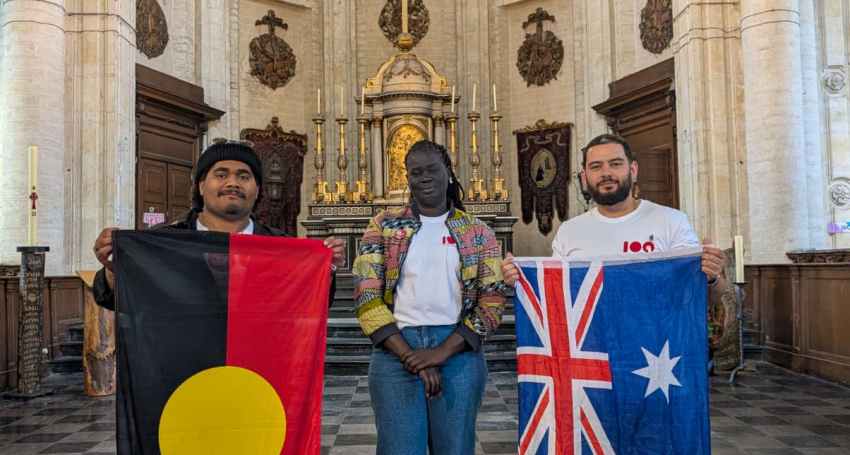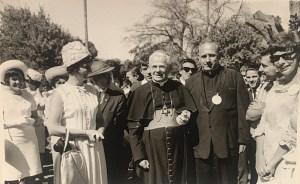Celebrating 100 years of YCW
People
Two South Australian Young Christian Workers leaders - one from the past and one from the present - speak about the impact of the global movement on their lives, ahead of a local celebration of its 100th anniversary on September 20.

Founded in Belgium in 1925 by Cardinal Joseph Cardijn, YCW has a rich and longstanding history in Adelaide, reflected in the city having the only Cardijn-dedicated institution in the country – Cardijn College.
At its peak in the 1960s and 70s, thousands of young Catholic men and women were drawn to its focus on the dignity of work and the social side of the organisation, whether it be the monthly dance or the netball and footy teams.

Carmel Devonish (nee Clancy)
Carmel Devonish (nee Clancy) knows all too well the big part that YCW played in the life of the Church. For her and many others it was a natural progression to join a Church youth group when she left school.
She joined the YCW after moving to Semaphore from Murray Bridge with her family in the late 1950s. Educated at St Joseph’s Murray Bridge, she gained employment at a solicitor’s officer as a junior on the recommendation of her assistant parish priest Fr Bob Wilkinson.
Advertisement
“Joining the church youth group, which was the YCW, was your ticket to a social life and to freedom really,” she said.
“It was based on Joseph Cardijn discovering that young people lost their faith very quickly and often worked in abysmal circumstances.
“As a national and international movement, the parish structure comprised a leaders’ group of about 8 to 10 young people who met once a week to look at the Scriptures and reflect on their lives, using the ‘see, judge, act’ technique.
“Then there was a general group for those who just wanted a social life which included a dance once a month and sporting competitions for netball, football and basketball.
“It was a fairly prominent organisation in the Church, but it wasn’t there to do parish work as such, it was meant for the growth and development of younger people.
Carmel rose to the ranks of Diocesan president and at the age of 24 was employed on a full-time basis in the YCW office in Victoria Square.
Her role involved time travelling to country towns, including in the Port Pirie and Broken Hill dioceses, to spread the word about YCW.
“I often wonder how I got there – I must have caught the train or hitched a ride with someone,” she recalled.

Carmel with Cardinal Cardijn during his visit to Adelaide.
Carmel was front and centre when Joseph Cardijn, the movement’s founder, visited South Australia in 1966, and described him as the “Katy Perry of his day”.
“The leaders were all taken terribly seriously,” she said.
“It was certainly very exciting that he came…he said Mass for the executive at Robe Tce with Archbishop James Gleeson and there was a weekend rally attended by thousands of young people.
“Then there was a garden party, I remember walking around with my arm through his, and introducing him to kids. He always asked them about their work.”
Advertisement
She said Cardijn’s mantra was that you “don’t get to heaven in spite of daily life but through daily life”.
Through Carmel’s involvement with YCW she became a member of the ground-breaking Lay Apostolate Liaison Committee which met regularly with Archbishop Gleeson.
She was fortunate to be selected as one of three representatives from the Committee to attend the World Congress of Lay Apostolate in Rome in 1967.
It was at the first Congress in 1951that Joseph Cardijn gave a keynote address in which he spoke about the role of the lay person in transforming the world “in his personal life, in his family, professional, social, cultural and civic life, on the national and international planes”.
Carmel was 25 when she travelled to Rome with the other two Adelaide Archdiocese delegates, Bill Byrne and Dr Peter Davis. They joked that her job at the Congress was to say “I don’t understand that”.
After Rome she travelled to Ireland, Canada and the United States where Archbishop Gleeson had “lined up” various Church groups and individuals for her to meet.
She said it was an exciting time in the life of the Church, especially with Archbishop Gleeson being so committed to involving lay people in the Archdiocese after his participation in Vatican II.
After leaving the YCW Carmel continued her involvement in the Archdiocese, working for Catholic Family Welfare Bureau (now Centacare) and its Immigration Office which assisted with the settlement of migrants. She then worked for Natural Family Planning for close to 20 years before taking on the role of appointment secretary for Minister of Education Greg Crafter, who had also been heavily involved in YCW, and then as a judicial support officer in the Environment Court.
Now 82 and living with her husband Jeff in Tanunda, Carmel said Cardijn was “such a significant person in the life of YCW in the 60s” that his principles had stayed with her and “a lot of others” for the rest of their lives.
“So I’m very grateful for that,” she said.
Joseva Saukuru initially became involved with YCW’s youth branch, Young Christian Students (YCS), during his secondary schooling at Cardijn College where he said he discovered “the inspiring legacy of Joseph Cardijn and what he stood for”.
Two years into his university journey, he reconnected with the movement through Sisilina Saukuru, the current Youth Engagement officer in Adelaide, who was promoting the launch of their significant initiative, SOL MUSIC.
Joseva said he was drawn to the YCW movement by “a sense of familiarity and a desire to make a meaningful impact”.
“As I delved deeper into its values and mission, my initial interest evolved into a profound commitment to remain actively engaged,” he said.
“While YCW’s roots are within the Catholic Church, it has grown into a vibrant community embracing diverse cultures, backgrounds and religions.
“We come together, united by our shared mission to advocate for workers’ rights and be a voice for the voiceless.”
Joseva said YCW provided him with a platform to live out his faith in the broader community, allowing him to connect with individuals from different or non-religious backgrounds. At the same time, it has helped deepen his faith.
“Joseph Cardijn’s methodology of SEE, JUDGE, ACT has profoundly influenced me since my high school days,” he said.
“Its timeless and universal nature makes it applicable to daily life and provides a foundation for engaging in deep discussions. This method has been invaluable in my ministry work at my local parish, whilst also helping to illuminate areas where I have personally needed growth.
Originally from Fiji, Joseva moved to Australia in 2007 and recently graduated from the University of South Australia with a bachelor’s degree in Design.
The 23 year old works casually as a stage technician and is heavily involved in his local parish and participate, Noarlunga-Seaford, and in various ministries across Adelaide.
Despite a decline in the number of young people attending Catholic churches, Joseva is confident that the YCW movement will continue to flourish because of its emphasis on “educating ourselves, speaking up, and following through with actions”.
“I believe even more young people could be attracted to the Catholic Church with increased support from our dioceses for our various actions and initiatives,” he said.
“Cardijn’s Review of Life (ROL) methodology is an excellent tool that engages young Catholics by teaching faith through action, something youth groups and ministries could implement in their own circles.
“The future of YCW lies in the ongoing opportunity for faith in action—an invitation to learn about faith, morals, and values through experience, not merely theory.”
Related Story
Keeping Christian values relevant
Joseva was one of three Australian delegates at the YCW Centenary in Belgium earlier this year in May, joining two YCW leaders from Sydney and Melbourne.
He described the event as a “a once-in-a-lifetime opportunity to connect with members from around the world who share a common vision”.
“It was especially valuable to exchange realities and discuss both common and unique issues faced by each country, along with the various actions and methods employed to raise awareness and drive impactful change,” Joseva said.
“The experience illuminated the importance of the small actions we undertake in our respective countries, as these efforts can create a ripple effect that, while not immediately visible on a global scale, can make a significant difference over time.”
Joseva said he returned inspired to apply what he learned to the local YCW movement.
“I feel deeply honoured and blessed to have been chosen as a delegate representing both South Australia and Australia as a whole,” he said.
“I hope to continue growing not just as a member of the YCW movement but also as a person, striving to contribute meaningfully and to embrace new opportunities for learning and development.”
- A centenary Mass will be celebrated at 11am on September 20 at Cardijn College (Marian Campus), followed by lunch and a forum to exchange stories and memories. Bookings here.











